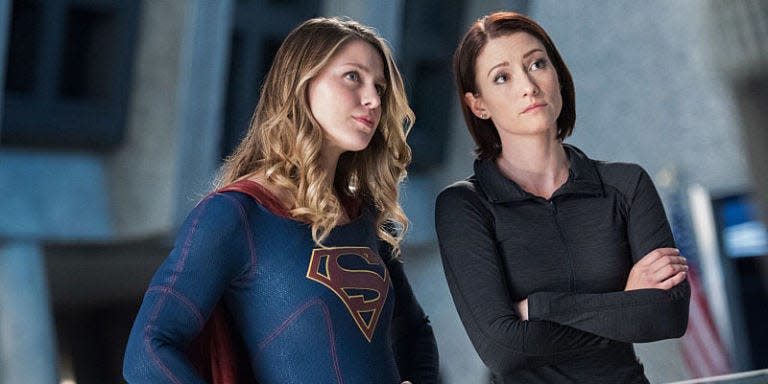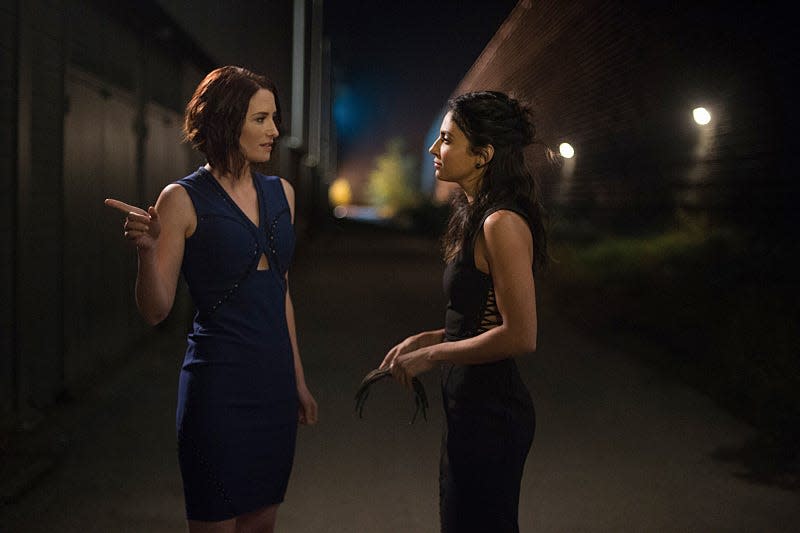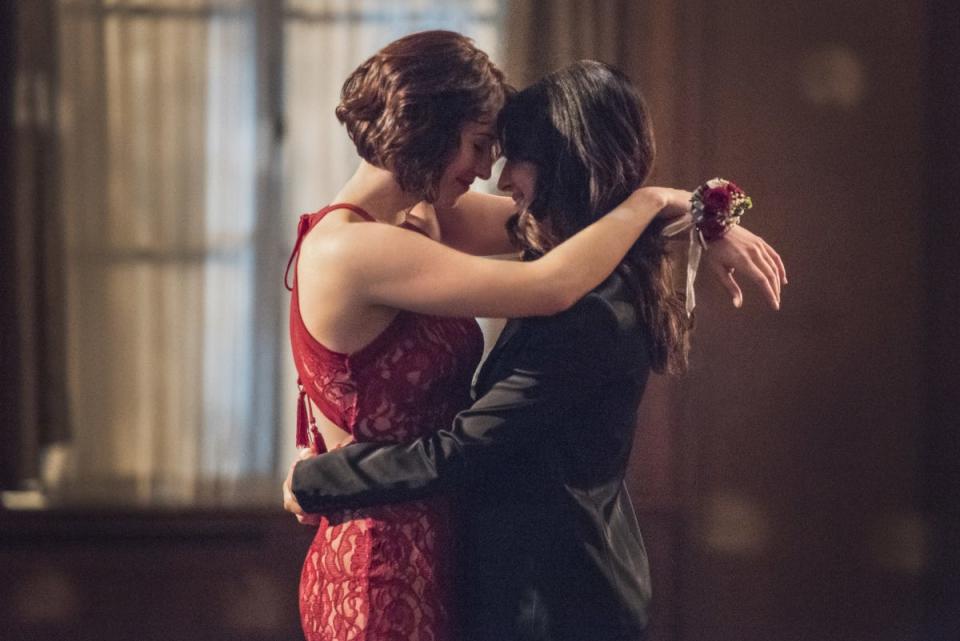How 'Supergirl' Became one of the Most LGBTQ-Friendly Shows on TV

- Oops!Something went wrong.Please try again later.
Superhero stories: simple cartoon escapism, right? Superpowers that cut through tough everyday situations, saving souls and intervening before danger can strike—a total fiction, surely. But in the case of Supergirl, the DC Comics character, and the CW's television series about her, startlingly meaningful things are happening to fans in real life. And it's all because of a particular storyline in Supergirl, in which the character Alex Danvers (played by Chyler Leigh) comes out as a lesbian.
Take a real-life tale that went viral on Twitter in December 2016. A comic book store clerk notices a teenage girl walking up and down the new release aisle. The clerk, Mary Swangin, heads over to help. Thanks to the now much-shared Twitter story, many know what happened next. The teen explains that she's looking for Supergirl, and Swangin asks if she watches the show. Making conversation—she's not just good at her job, she's also a huge comics fan herself—Swangin says she's a big #sanvers shipper: a term that refers to the relationship between Supergirl characters Alex Danvers and Maggie Sawyer (played by Floriana Lima).
I mention that I'm a huge #Sanvers shipper and the poor thing just breaks down in tears.
— 🏳️🌈Mary🏳️🌈 (@sapphicgeek) December 3, 2016
That's it: The dam breaks. Tears start flowing down the girl's face, and Swangin realizes she's just met a young woman coming to terms with her sexuality. How does she know? Well, it's like looking in a mirror. She went through the same thing herself. Swangin offers reassurance, knowing all too well the feelings of isolation and apprehensiveness; she herself was forced out after a friend she'd confided in about liking girls spread the news far and wide. "I was probably about her age when all this stuff happened," she tells me. "I almost wasn't looking at her, I was looking at myself."
She tells me that she's just wanted to kill herself for so long and that she had tried but just made herself sick.
— 🏳️🌈Mary🏳️🌈 (@sapphicgeek) December 3, 2016
The girl confesses that she'd tried to kill herself—a heartbreaking detail that highlights the higher suicide rate amongst LGBTQ youth. Supergirl, though, came to the rescue, but not in fantastical, comic-book fashion. Watching Alex's story on TV helped. Alex, an outrageously smart, effective special agent, and adopted sister to Supergirl, realizes she's gay when she meets police detective Maggie Sawyer (who, in the comic book world, is actually Batwoman's partner). Seeing a successful, admirable character come out on television and continue to have a professional life, a family life, and a romantic life saved her own.
That's not all. In January, Dened Rey was on a flight to Vancouver watching Supergirl—the episode where Alex reveals to her superhero sister that she's a lesbian.
So, yesterday on my flight to Vancouver I was watching Supergirl, more specifically, the episode where Alex comes out to Kara.
— dened rey moreno 🌈 (@Hajabeg) January 4, 2017
A man interrupts her viewing to tell her she's being "inconsiderate and disrespectful" of the children on board and that she shouldn't expose them to the "gay abomination" on her screen. He casts racial slurs and homophobic epithets at her, before demanding a flight attendant move him to another seat.
Becoming increasingly upset, Rey explains to the flight attendant what has happened; another passenger corroborates her story. The flight attendant upgrades her to a first class seat. That would have been a heartwarming tale in itself, but there's more. Rey's new neighbor also notices what she's watching. But instead of complaining, like Rey fears, the woman has her own story to share about how Supergirl changed her life.
She asks if I'm alright, I tell her no - I'm still angry - then tell her what happened. Once I'm done, she tells me Supergirl helped her.
— dened rey moreno 🌈 (@Hajabeg) January 4, 2017
The woman in first class explains that when her best friend told her she was a lesbian, she couldn't handle it. But Supergirl, which her daughter loved, helped her to understand the friend's struggle more—and even prepared her for the possibility that her own daughter was gay.
But watching Alex Danvers' journey with her daughter "who, mind you, I'm sure she's a little bit gay" helped her understand her best friend.
— dened rey moreno 🌈 (@Hajabeg) January 4, 2017
According to Megan Townsend, GLAAD's senior strategist for entertainment, this kind of real-world impact is the exact reason LGBTQ representation is so important. (GLAAD recognized Supergirl with a nomination for outstanding drama series in its annual media awards.) "Entertainment media has always had a reciprocal relationship with society. It both reflects social realities of our culture while also shaping them," she explains over the phone. "So if you don't know an LGBTQ person in real life and you're watching TV and you see us, and get to know us and care about us, that breeds understanding—and acceptance comes from that understanding. There can't be any of that understanding without that visibility."

In GLAAD's 2016 "Where We Are on TV" report, the media organization identified that 4.8% of regular characters on broadcast scripted primetime programming were gay, lesbian, bisexual, transgender, and queer. Townsend says that's a record high, but notes that there's still work to be done. "It's important that LGBT characters aren't just present on screen," she says. "It's important that they're crafted with care, thought, and substance, and that they're nuanced and fully realized characters and not just a shallow stereotype."
Alex—and her coming-out story—is certainly no shallow stereotype. When she meets Maggie early in the show's second season, there's clear chemistry, although she doesn't yet understand it. Her initial ruffled feathers becomes a puppyish enthusiasm that Maggie reads as romantic interest—which she quickly tries to defuse. Alex, who hadn't understood the source of her emotions, is confused and denies that she's interested in women. What follows is the nuanced, remarkably moving, and believable reckoning of an adult woman coming to terms with something she had never consciously known about herself, and the consequences that has for all the other elements of her life.
Beloved by fans and her creators alike, Alex's story was never going to be treated like a tacky add-on; the careful treatment of this plot has earned praise from critics and viewers. For Andrew Kreisberg, one of Supergirl's executive producers, Alex's coming-out arc was no "daring retcon" deployed to create waves. While she's one of the show's main characters, he explains, there was something missing from her story from the beginning: "There was always a sort of quiet sadness about her that even I, as one of her creators, could never put a finger on." And while her sexuality wasn't always planned, when the showrunners decided that she would come out, it "actually filled in all the blanks."
Mary...This story. This right here is what Heroes are made of. You are AMAZING!! I absolutely admire you and will share this!
— Chyler Leigh (@chy_leigh) December 3, 2016
One person who has been notably affected by fans' response to Alex's story is the actress who plays her. Leigh's empathetic, vulnerable performance brings the story to life—so persuasively that fans have asked her whether she's gay, she jokes over the phone. From embracing the couple's hashtag on Twitter to responding to the many messages she's received from fans since Alex came out, Leigh has been fully supportive of the fandom: "It's been incredibly impactful to watch [Alex's growth] be so relatable to so many people." The actress actually provided one of the early signal boosts for Swangin's Twitter story, because she was so moved "that this young lady could have such a tremendous impact just by being herself, and just by being kind."
Needless to say, Leigh was surprised to learn that the character she'd already played for a full season would be coming out as a lesbian: "I was…I wouldn't say terrified, but I felt an enormous amount of pressure that I put on myself. It's a really big deal to me personally, because I knew that there was so little representation of it on television."

It's a testament to Supergirl's treatment of the story that it resonates so strongly with viewers. "I've actually gotten quite a few messages and stories that mirror very much what Alex's situation was," Leigh says. Fans in their thirties and forties have told her that watching her helped them "put the pieces of the puzzle together," to the extent that Alex's dialogue has given them a model of what to say and expect in their own coming out. "The lightbulb moments that people have shared with me have been tremendous." The woman behind Alex feels that her responsibility towards the role doesn't stop at acting; she wants to help build community around the character and support for those fans: "If I have a reach of a platform of hundreds of thousands of people, I would be doing a disservice to myself and to people in our position to not reach out."
Sometimes, it's all too easy to think of pop culture representation as simply an abstract concept, or a flashy byword for woke creatives. But Supergirl reminds us that it really does matter, whether it serves as life-and-death intervention for a teen or stokes empathy in people who might otherwise never be able to look outside themselves.
When I ask Swangin whether comics helped her come to terms with her sexuality, she emphatically confirms it. In her case, it was the lesbian character Batwoman who lit the path. "Coming out in the Midwest is not fun," she laughs. "And I think it was finding a character who was a lesbian who could be above all this—she could be strong, she could be a hero—was just that little bit that I needed to show me that I wasn't just a victim. I wasn't this terrible burden on society." Superheroes: not as make-believe as you think.
Supergirl airs on the CW on Mondays at 8 p.m.
You Might Also Like

